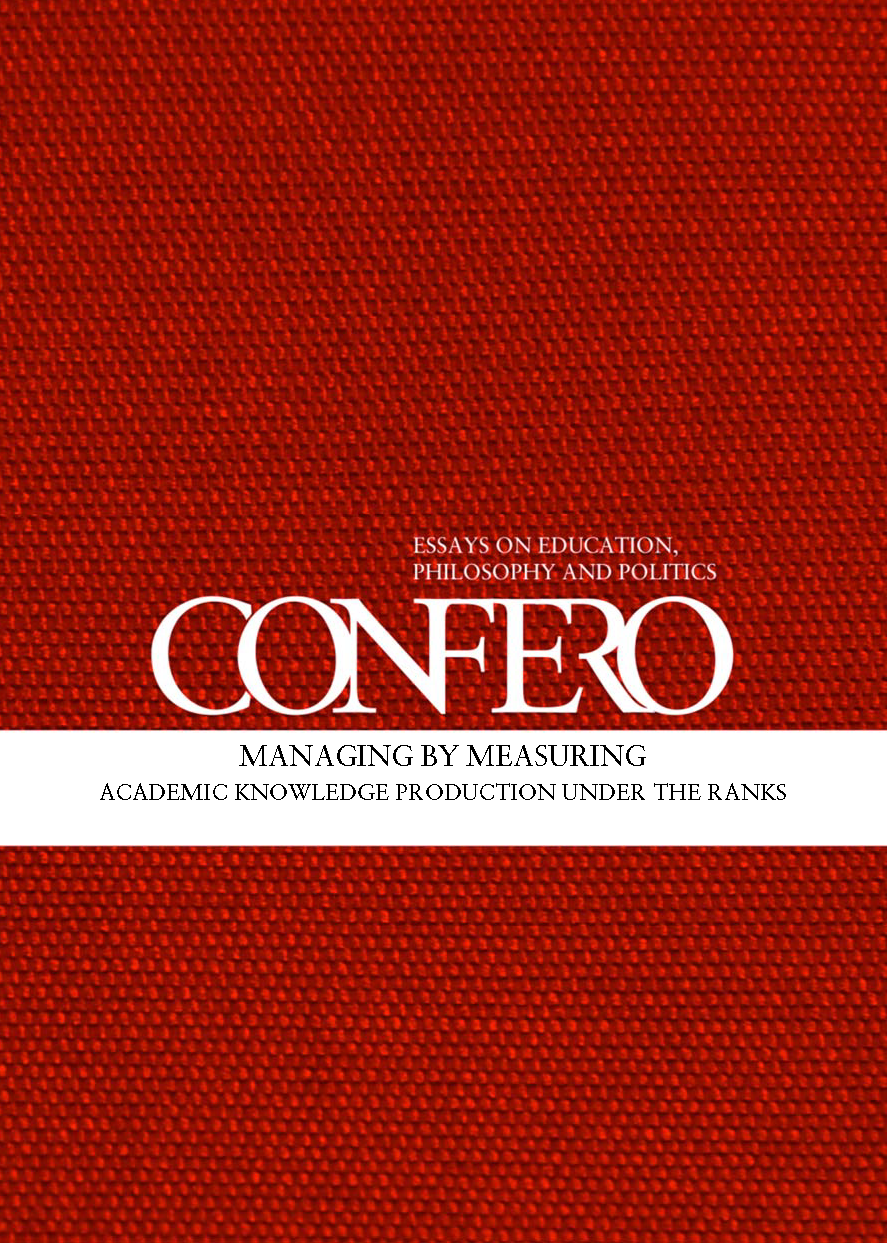Drowning by numbers
On reading, writing and bibliometrics
DOI:
https://doi.org/10.3384/confero13v1121207aAbstract
The purpose of this text is manifold. The primary purpose is to look into the effects of marketization of academia on the reading habits of academics, which also demands a problematization of reading and its role in the process of creating new knowledge. The second purpose is to discuss and problematize the citation as a sign of intellectual debt. And the third, but not least important, purpose is to write a text that demands the reader to read in a manner that is necessary to learn, instead of writing it in a manner that is adapted to promoting “citability”. And so of course, what I would like more than anything to teach the reader is that the only possible way forward, the only method of reproducing real scholarship in a commodified setting, is to live it yourself. This way of writing a text is my way of living eal scholarship. If this does not agree with you – don’t bother citing me.
References
Eli F. Heckschers archive. L 67, Royal Library.
***
Andersson, Jenny. The Library and the Workshop. Social Democracy and Capitalism in the Knowledge Age. Stanford, Stanford University Press, 2009.
Ankarloo, Daniel and Fribergh, Torbjörn (eds.). Den högre utbildningen. Ett fält av marknad och politik. Möklinta, Gidlunds, 2012.
Ball, Stephen. “Education for sale? The commodification of everything?” King’s College Annual Education Lecture. http://www.kcl.ac.uk/content/1/c6/05/16/42/lecture-ball.pdf, 2004.
Ball, Stephen. Education Plc. Understanding Private Sector Participation in Public Sector Education. London & New York, Routledge, 2007.
Chayanov, Alexander Vasilevic. On the Theory of Peasant Economy. American Economic Association Translation Series, 1966.
Cozzens, Susan E. “What do citations count? The rhetoric-first model”, Scientrometrics, vol. 15, 1989, p. 437-447.
Djelec, Marie-Laure. ”Scholars in audit society: Understanding our contemporary iron cage”, in, Lars Engwall (ed.) Scholars in Action. Past, Present, Future. Acta Universitatis Upsaliensis, Nova Acta Regiae Societatis Scientiarum Upsaliensis, vol. 2, 2012.
Eli F. Heckschers bibliografi, 1879-1949. Skrifter utgivna av Ekonomisk-historiska Institutet i Stockholm, 1950.
Elzinga, Aant (2009): “Evidence-based science policy and the systematic miscounting of performance in the humanities”. Paper to workshop on evidence-based policy, University of Gothenburg 19-20 May 2008.
http://humaniorasociety.wordpress.com/2009/04/ (2012-05-14).
Hasselberg, Ylva. Den sociala ekonomin. Familjen Clason och Furudals bruk 1804-1856. Acta Universitatis Upsaliensis, Studia Historica Upsaliensia 189, 1998.
Hasselberg, Ylva. ”Demand or discretion? The market model applied to science and its core values and institutions”, Ethics of Science and Environmental Policy, vol. 12, 2012, p. 35-51 (a). doi: 10.3354/esep00118
Hasselberg, Ylva. “Arbete, kunskap, alienering”, in: Ankarloo, Daniel and Fribergh, Torbjörn (eds.). Den högre utbildningen. Ett fält av marknad och politik. Möklinta, Gidlunds, 2012.
Lewis, Clive Staples. The Lion, the Witch and the Wardrobe. London, HarperCollins. 1950: 2001.
Lewis, Clive Staples. The Voyage of the Dawn Treader. London, HarperCollins, 1952: 2001.
Mirowski, Philip. Science Mart: Privatizing American Science. Cambridge, Mass, Harvard University Press, 2011.doi: 10.4159/harvard.9780674061132 PMCid:3438635
Mirowski, Philip and Sent, Ester-Mirjam. ”The commercialisation of science and the response of STS”, in (Hackett et al. (eds.) The Handbook of Science and Technology Studies. Cambridge, Mass. & London, MIT Press, 2008.
Morris, Norma. “Science policy in action: policy and the researcher”, Minerva, vol. 38, no. 4, 2000, p. 425-451. doi: 10.1023/A:1004873100189
Pestre, Dominique.“Des sciences et des productions techniques depuis trente ans. Chronique d’une mutation”, Le Débat, no. 160, 2010.
Polanyi, Karl. Den stora omdaningen. Marknadsekonomins Uppgång och Fall. Lund, Arkiv, 1989.
Poovey, Mary. A History of the Modern Fact. Problems of Knowledge in the Science of Wealth and Society. Chicago, University of Chicago Press, 1998. doi: 10.7208/chicago/9780226675183.001.0001
Porter, Theodore. “Objectivity and authority. How French engineers reduced public utility to numbers”. Poetics Today, vol. 12, 1991, p. 245-265. doi: 10.2307/1772852
Porter, Theodore. Trust in Numbers. The Pursuit of Objectivity in Science and Public Life. Princeton, Princeton University Press, 1995.
Power, Michael. The Audit Society. Rituals of Verification. Oxford, Oxford University Press, 1997.
Ylijoki, Oili-Helena and Mäntylä, Hans. “Conflicting time perspectives in academic work”. Time and Society, vol. 12, 2003, 55-78. doi: 10.1177/0961463X03012001364
Downloads
Published
Issue
Section
License
Copyright (c) 2012 Ylva Hasselberg

This work is licensed under a Creative Commons Attribution 4.0 International License.
As Confero is an open access journal, this means that anyone who can access the Internet can freely download and read the journal. There are no commercial interests for Linköping University Electronic Press or Confero in publishing the journal.
The core idea of open access is that copyright remains with the author(s). However, we publish with the agreement of the author that if she or he decides later to publish the article elsewhere, that the publisher will be notified, prior to any acceptance, that the article has already been published by Confero.
When publishing with Confero, it is with the agreement of the author that if they make their article available elsewhere on the internet (for example, on their own website or an institutional website), that they will do so by making a link to the article as published in Confero using the Digital Object Identifier (DOI) number of the article and acknowledge in the text of the site that the article has been previously published in Confero.
As evident by the markers on our homepage, Confero falls under the Creative Commons licence abbreviated BY. This means that we allow others to use, spread and elaborate on the published articles, as long as they acknowledge who published it and where it was originally published.



